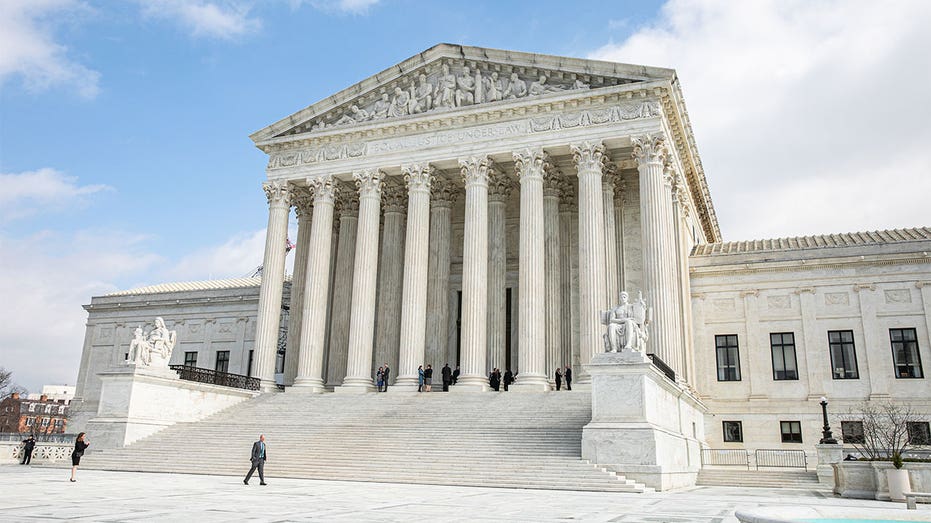Parody, pet poop and product protection will be before the U.S. Supreme Court in a humorous take on a serious subject: when spoofs of well-known commercial brands go too far under federal law.
The justices will hear oral arguments Wednesday in an appeal from distiller Jack Daniel’s, which is suing to stop an Arizona company from selling plastic dog toys that look similar to its iconic whiskey labels and bottles.
It is the latest high-profile intellectual property rights case at the Supreme Court. A ruling expected by June could clarify the limits of the First Amendment in such trademark infringement disputes.
At issue is the “Silly Squeakers” line of dog toys, with some that mimic well-known brands.
NEW JACK DANIEL’S INDIAN MOTORCYCLE HAS WHISKEY IN THE PAINT
Phoenix-based VIP Products markets dozens of novelty pet products, including the 18-inch “Bad Spaniels” vinyl toy shaped like a liquor bottle, advertised on its website as “Silly and Fun For Everyone!”
The high-end whiskey maker in its appeal refers to the toy as “poop-themed” and says the parody product damages its valuable brand by confusing customers.
The chew toy has the words “The Old No. 2 on Your Tennessee Carpet,” a play on the Jack Daniel’s phrase “Old No. 7 brand.” And while the Jack Daniel’s bottle reveals that it is 40% alcohol by volume, the toy’s label playfully indicates that it is “43% Poo by Vol.” and “100% Smelly.”
VIP says its packaging makes clear that “This product is not affiliated with Jack Daniel Distillery.”
GEORGIA SUPREME COURT UNDECIDED ON FATE OF APPEALS JUDGE ACCUSED OF ETHICAL MISCONDUCT
In what passes for judicial humor, intellectual property experts and legal bloggers have been playfully previewing the case online, wondering if the high court, in a “spirited debate,” will be “laying waste” to its trademark precedents; whether its ruling will have “bark and no bite.”
Even the attorneys from both sides have tried a light-hearted approach in their briefs with the high court.
“Jack Daniel’s loves dogs and appreciates a good joke as much as anyone. But Jack Daniel’s likes its customers even more, and doesn’t want them confused or associating its fine whiskey with dog poop,” wrote lawyers for the company to the court.
If their appeal fails, they warned that “anyone could use a famous mark to sell sex toys, drinking games, or marijuana bongs, while misleading customers and destroying billions of dollars in goodwill — all in the name of just having fun. Humor does not transform [federal law] into a trademark free-for-all.”
Levi Strauss, Nike and Campbell Soup Company are among those filing amicus briefs in support of Jack Daniel’s.
But the pet products company counters, “It is ironic that America’s leading distiller of whiskey both lacks a sense of humor and does not recognize when it — and everyone else — has had enough.”
NORTH CAROLINA SUPREME COURT USES NEW REPUBLICAN MAJORITY TO REHEAR ARGUMENTS IN REDISTRICTING CASE
“In the playful parodic tradition that has ranged over a half century from Topps’s Wacky Packages trading cards through ‘Weird Al’ Yankovic, VIP put out a chewable dog toy. VIP has never sold whiskey or other comestibles, nor has it used ‘Jack Daniel’s’ in any way (humorously or not). It merely mimicked enough of the iconic bottle that people would get the joke.”
In an unusual move, VIP asked the court for permission to submit 10 of its actual “Bad Spaniels” toys for the justices to personally examine, even encouraging them to “squeak” them for effect.
Various advocates for free speech and artistic expression have filed legal briefs to support VIP Products, some arguing that “cultural signifiers” used in movie takeoffs, “fanzine” tributes and political blogs would be threatened if the law’s protections were limited.
A federal appeals court in San Francisco ruled for VIP, concluding that “the Bad Spaniels dog toy is an expressive work entitled to First Amendment protection.”
The Justice Department has suggested that the justices take a pass on deciding the issues at this stage and throw the case back to the lower courts to resolve some important legal questions.
This is the second high-profile intellectual property case the Supreme Court is addressing this term.
In October, the justices debated a fair-use dispute over an image of the late music superstar Prince by the equally famous late artist Andy Warhol.
Photographer Lynn Goldsmith took an iconic 1981 photograph of the singer, which Warhol later used to create a series of silkscreen images that illustrated magazine profiles.
At issue in that case is whether a work of art is transformative if it conveys a different meaning or message from its source material, or whether courts cannot consider the meaning if it “recognizably derives from” its source material.
A ruling in that case is due in coming months.
SUPREME COURT COULD TAKE FIRST TRANSGENDER SPORTS CASE WITH APPEAL FROM WEST VIRGINIA SOCCER PLAYER
The high court in both the Warhol and whiskey cases are being asked to navigate an admittedly subjective inquiry – just when derivative designs cross a line into a copyright or trademark violation, even when it involves low-brow, scatalogical humor.
Under “the fair use” doctrine, a copyrighted work or trademarked brand can be appropriated under certain conditions – a legal standard designed to foster further creativity and freedom of expression. Such “transformative” works can be used in commentary, criticism and commercial parody.
But under the key federal trademark infringement law – known as the Lanham Act – those suing typically must show, among other tings, the offending work or brand “explicitly misleads” or confuses consumers.
That standard has long been debated in the courts, and here the justices are being asked to clarify the limits in the digital age, when artificial intelligence and computer technology makes transforming art and brands easier and more pervasive.
Under the “Rogers test” used by federal courts over the years, judges are asked to balance the “right to protect [a] celebrated name and the right of others to express themselves freely in their own artistic work.”
It was named after the late actress Ginger Rogers, who lost her lawsuit over the 1986 Fellini film “Ginger & Fred” about two Italian cabaret singers. Rogers claimed that the movie violated her trademark rights, but an appeals court found that expressive uses of trademarks deserve heightened free speech protection.
What the court decides could have major implications beyond commercial products and into the current fractious political expression, with satire sites like “The Babylon Bee” and TV comedy shows like “Saturday Night Live” skewering elected leaders, ideological movements, and celebrity and corporate culture in general.
That includes the recent “culture jamming” phenomenon, which the dictionary defines as “a form of political and social activism which, by means of fake adverts, hoax news stories, pastiches of company logos and product labels, computer hacking, etc., draws attention to and at the same time subverts the power of the media, governments, and large corporations.”
Well-known corporate logos and symbols are typically altered in a satiric or ironic fashion, sometimes called “guerrilla communication,” because of its frequent grassroots, anonymous origins and use in flash mobs and graffiti.
Even the nine justices could indirectly expand or limit parodies of themselves.
Case in point: The court last month denied a separate appeal from an Ohio man who created a Facebook page to mock his local police department. He wanted to sue after being arrested and initially charged with violating a state law that makes it illegal to “disrupt” or “interrupt” police functions.
The “Onion” website filed an amicus brief to argue on the societal and cultural benefits of satire in political critique – making its point in an uproarious, tongue-in-cheek fashion.
When addressing the justices directly, the satiric “news” site was blunt: “The Onion knows that the federal judiciary is staffed entirely by total Latin dorks.”
The current case is Jack Daniel’s Properties v. VIP Products LLC (22-148).
























